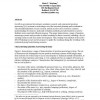581 search results - page 51 / 117 » Coordination in answer set programming |
CORR
2011
Springer
13 years 3 months ago
2011
Springer
Nonmonotonic causal logic, introduced by Norman McCain and Hudson Turner, became a basis for the semantics of several expressive action languages. McCain’s embedding of definit...
KBSE
2000
IEEE
14 years 1 months ago
2000
IEEE
Little-JIL, a new language for programming the coordination of agents is an executable, high-level process programming language with a formal (yet graphical) syntax and rigorously...
JAIR
2007
13 years 8 months ago
2007
This work is a contribution to prioritized reasoning in logic programming in the presence of preference relations involving atoms. The technique, providing a new interpretation fo...
NDQA
2003
13 years 10 months ago
2003
Growth in government investment, academic research, and commercial question answering (QA) systems is motivating a need for increased planning and coordination. The internationali...
ECAI
2000
Springer
14 years 1 months ago
2000
Springer
There are two major approaches to activity coordination in multiagent systems. First, by endowing the agents with the capability to jointly plan, that is, to jointly generate hypot...


